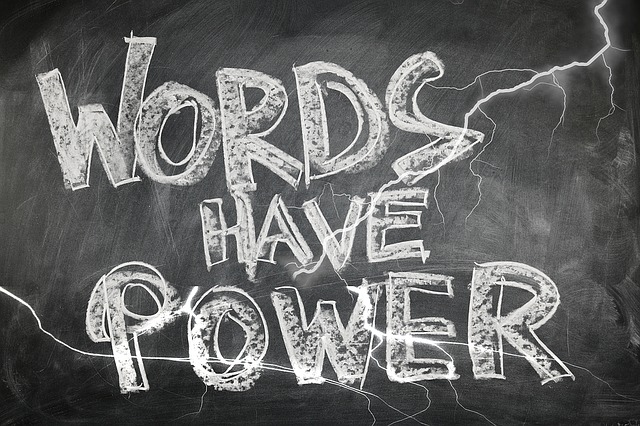“Sticks and stones will break my bones but words will never hurt me.” That little saying that we all have heard, and perhaps said, is not true. And we know it’s not true – not because sticks and stones won’t break our bones, they will – but because words can and do hurt. Everyone reading this post has been hurt by words.
Words are powerful, and we all know that. They can not only hurt, they can also heal, lift up, encourage, warm our hearts, ask for and receive forgiveness, and do much, much more.
Earlier this week I read an eBook entitled Ancient Wisdom For Future Success. The ancient wisdom cited comes from the Old Testament book of Proverbs. The book of Proverbs also offers a lot of ancient wisdom with regard to The Power of Words. There are over 100 references in the book to the tongue, mouth, lips, and words. A general foundational verse is Proverbs 18:21, “The tongue has the power of life and death,
and those who love it will eat its fruit” (NIV).
Here is a verse that underscores both the potential for words to be hurtful or helpful: Proverbs 15:4, “The soothing tongue is a tree of life, but a perverse tongue crushes the spirit” (NIV).
Here are five of my favorites that underscore ways words hurt and damage:
10:19, “Too much talk leads to sin. Be sensible and keep your mouth shut” (NLT).
11:9a, “With their words, the godless destroy their friends” (NLT).
11:12, Mean-spirited slander is heartless; quiet discretion accompanies good sense” (The Message).
25:18, “Telling lies about others is as harmful as hitting them with an ax, wounding them with a sword, or shooting them with a sharp arrow) NIV.
29:5, “Those who flatter their neighbors are spreading nets for their feet” (NIV).
Here are four of my favorites that underscore ways words help and heal:
10:11,”The words of the godly are a life-giving fountain” (NLT).
12:18, “Some people make cutting remarks, but the words of the wise bring healing” (NLT).
12:25, “Worry weighs us down; a cheerful word picks us up” (The Message).
16:24, “Gracious words are a honeycomb, sweet to the soul and healing to the bones” (NIV).
With those verses in mind, consider these four suggestions for the way we use words.
- First, we must learn to listen. It may sound trite, but in thinking about the power of words we need to be reminded that we need to listen. James 1:19 gives us good advice: “My dear brothers and sisters,take note of this: “Everyone should be quick to listen and slow to speak” (NIV). Some of us have a problem of assuming what a person is going to say before they say it. Years ago I saw a sign on a person’s desk that has stayed with me. It said “I love you enough to listen.”
- Second, we must think before we speak and choose our words carefully. Proverbs 29:20 says it well, “Do you see someone who speaks in haste? There is more hope for a fool than for them” (NIV).
- Third, we need to be honest with our words. Two of seven things God hates are “a lying tongue” and “a false witness who pours out lies.” I don’t have in mind here what some term as being “ruthlessly” honest. That may take us back to the destructive power of words. Ephesians 4:15a tells us “Speak the truth in love.” There is a way to speak the truth, but not in love. We are to speak the truth; but we are to do so in love.
- Finally, we need to take seriously Ephesians 4:29. Let me remind you of Paul’s powerful advice: “Do not let any unwholesome talk come out of your mouths, but only what is helpful for building others up according to their needs, that it may benefit those who listen” (NIV) Unwholesome talk may include foul language and dirty jokes, but I think unwholesome talk is that tears others down and that does not benefit those who listen is sarcasm, attacking, caustic, negative, and rude.
I’m pretty sure these verses and comments give us all a lot to think about – it certainly does me. I confess, I’m guilty of violating a lot of what God’s Word tells us about how we should talk. To get the most out of these verses it might be good to go over each of them and give yourself a grade from A to F.
I close with a declaration from Jesus in Matthew 15:18, “the things that come out of a person’s mouth come from the heart” (NIV).
Feel free to leave a comment below and/or share this post on Facebook.
Image by <a href=”https://pixabay.com/users/geralt-9301/?utm_source=link-attribution&utm_medium=referral&utm_campaign=image&utm_content=1106649″>Gerd Altmann</a> from <a href=”https://pixabay.com/?utm_source=link-attribution&utm_medium=referral&utm_campaign=image&utm_content=1106649″>Pixabay</a>

